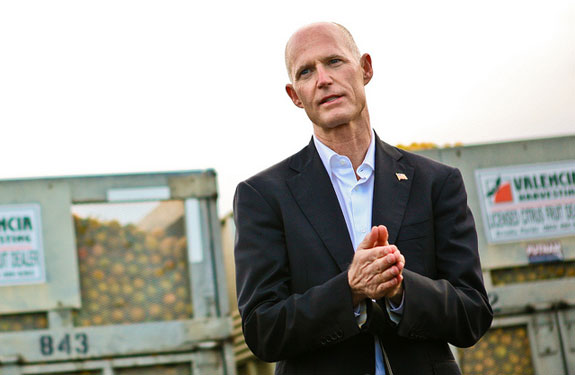
After his election, Rick Scott visited the Tropicana plant in Bradenton as part of a five-day "Let's Get To Work" jobs tour across the state. (Photo by Stacy Ferris.)
By Ralph De La Cruz
Florida Center for Investigative Reporting
Gov. Rick Scott made jobs a key component of his campaign, promising 700,000 new jobs — above and beyond the jobs which would have been naturally created by the economy — in seven years. And, once in office, he has continued to focus on jobs.
The agenda this past legislative session was all about making Florida friendlier for businesses, with corporate tax breaks and across-the-board loosening of regulations — even environmental regulations. Florida’s schoolchildren and teachers, public employees, and people with disabilities were all required to make sacrifices at the jobs altar.
And after all that, we’re still likely to remain in the jobs doldrums, according to an analysis of Florida businesses by Economic Modeling Specialists and published Tuesday in the St. Petersburg Times.
EMSI found that Florida absorbed the loss of 24,402 businesses, mostly small start-ups, in 2009 and another 2,194 in 2010. That at least seems to reflect an improving situation. But, EMSI warned, the loss of 26,596 businesses in two years is unprecedented.
“No state has seen that big of a cumulative drop in the last decade,” EMSI spokesman Joshua Wright told the Times.
Just to get a sense of what the loss of 24,402 businesses in a year represents, in the period up to 2008, Florida typically added 25,000 new businesses annually. It was one of the top states in the country for new business growth. But in 2009, it was ranked 51st (the District of Columbia is included in the rankings). Last year the Sunshine State was 43rd, although glee over that slight improvement should be tempered by the fact that 21 other states saw growth in new businesses.
What makes this development even more troubling is that, contrary to popular opinion that says small businesses are the job-creators in our economy, economists increasingly believe that job creation is not so much a factor of the size of the business, but rather the age of the business.
“The only group that disproportionately creates jobs is startups,” said Ron Jarmin, assistant director for research and methodology at the U.S. Census Bureau and coauthor of that research paper, titled “Who Creates Jobs? Small vs. Large Vs. Young.”
Start-ups like the 25,000-plus who shut down in Florida in the last two years.
There are some bright spots that might help start-ups rebound nationally, and in Florida: Credit is slowly loosening up, which is critical for small businesses and start-ups. The pace of job creation has almost doubled in 2011 over 2010. And oil seems to be stabilizing.
But considering that construction has been one of the hardest-hit industries in Florida — the EMSI analysis found that 17,000 construction start-ups failed between 2008 and 2010 in the state — and Florida remains at the center of the foreclosure crisis, it could be a tough climb back.
